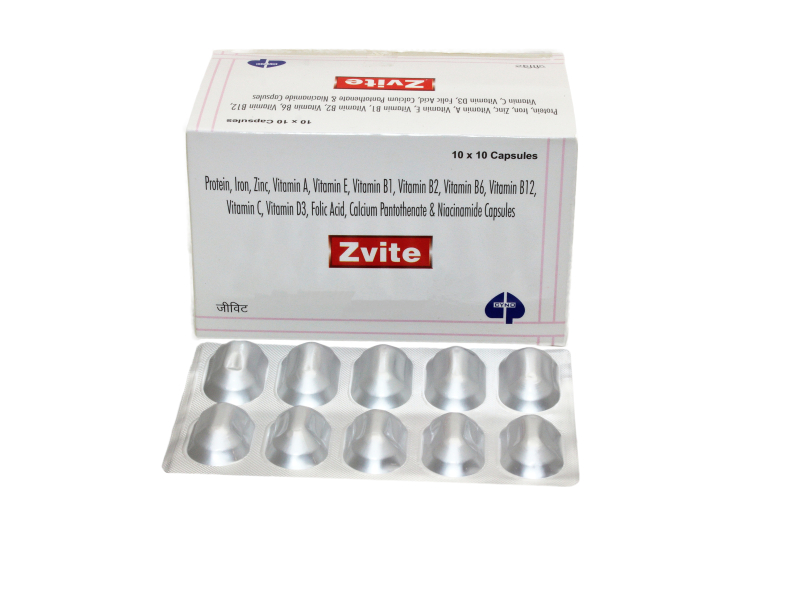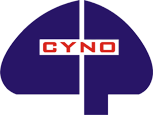ZVITE
Protein Hydrolysate (50%) (100 mg), Ferrous Fumarate (100 mg), Zinc Sulphate (50 mg), Vitamin A Concentrate (Power from a Acetate) (2000 I.U.), Vitamin E (7.5 mg), Vitamin B1 (1.5 mg), Vitamin B2 (2 mg), Vitamin B6 (1 mg), Vitamin B12 (1 mcg), Vitamin C (50 mg), Vitamin D3 (150 I.U.), Folic Acid (300 mcg), Calcium Pantothenate (1.5 mg), Niacinamide (20 mg)
Protein hydrolysate is a sterile solution of amino acids and peptides prepared from a protein by acid or enzymatic hydrolysis and used intravenously for the maintenance of a positive nitrogen balance in critical illness, following surgery of the alimentary tract, In infants allergic to milk, or as a high protein dietary supplement.
Hydrolysis potentially leads to greater distribution of amino acids from your intestine to your muscles, and may also increase the delivery speed compared to an intact protein. As a result, the time required for the liver to extract vital amino acids is shorter as they exit your muscles.

Mechanism of Action
Niacinamide has antipyretic, antimicrobial, vasoactive, photo-protective, sebostatic, and lightening effects depending on its concentration. Niacinamide regulates NF-B-mediated transcription of signaling molecules by inhibiting nuclear poly (ADP-ribose) polymerase-1 (PARP-1) within a complex metabolic system. Niacinamide is a well-tolerant and safe substance often used in cosmetics.
Free pantothenic acid is absorbed into intestinal cells through a saturated, sodium-dependent active transport system. At high levels of intake, when this mechanism is saturated, some pantothenic acids may be absorbed through passive diffusion.
Ferrous fumarate is a type of iron. You usually take iron from the foods you eat. In your body, iron becomes a part of your hemoglobin and myoglobin. Hemoglobin carries oxygen through your blood to tissues and organs. Myoglobin helps your muscle cells store oxygen.
Ferrous fumarate is used to treat iron deficiency anemia (deficiency of red blood cells due to too little iron in the body).
Vitamins are important for normal metabolism in the body. Vitamins vary in their chemical composition and are supplied in small amounts in the diet because they are not synthesized in the body or their rate of production is not sufficient for the maintenance of health (eg tryptophan to niacin synthesis).
Pharmacokinetic Properties:
- Absorption: Once in the stomach, ferrous fumarate and ferrous ions disintegrate due to the acid state of the gastric contents. These ions are absorbed through the proximal part of the duodenum. Ferrous iron, absorbed by the mucous cells of the duodenum, is oxidized to ferric form and is bound to proteins to form ferritin.
- Delivery: Ferritin in mucosal cells releases iron into the blood, where it binds to transferrin and is passed on to iron stores in the liver, spleen, and bone marrow. These stores constitute a reserve of iron for the synthesis of iron-containing hemoglobin, myoglobin, and enzymes.
- Elimination: Iron is lost from the body due to the loss of iron i.e. urine, feces, hair, skin, mucus, nails, mucosal cells, and lack of blood. Ferrous fumarate has the same pattern of absorption and excretion as dietary iron.
Drug-Drug interactions:
Your health professionals (eg, doctors or pharmacists) may already be aware of any possible drug interactions and may monitor you for them. Do not start, stop, or change the dose of any medicine before checking with them first.
Before using this medicine, have your doctor or pharmacist use all prescriptions and nonprescription/herbal products that you can use exclusively: especially some anti-seizure medications (eg, phenytoin), Chloramphenicol, methyldopa.
This product may reduce the absorption of other drugs such as bisphosphonates (eg, alendronate), levodopa, penicillin, quinolone antibiotics (eg, ciprofloxacin, levofloxacin), thyroid drugs (eg, levothyroxine), and tetracyclines. Antibiotic (Doxycycline, minocycline). Therefore, separate your dose of these drugs as far as possible from your dose of this product. Ask your doctor or pharmacist how long you should wait between doses and to help find a dosing schedule that will work with all your medications.
This drug may interfere with some laboratory tests (testing for blood in the stool), possibly causing inaccurate test results. Make sure that laboratory personnel and all your doctors know that you use this medicine.
Precautions:
Before taking this medicine, tell your doctor or pharmacist if you are allergic to it; Or if you have any other allergies. This product may contain inactive ingredients, which may cause allergies or other problems. Talk to your pharmacist for more details.
Do not use this medicine if you have some medical condition. Before using this medicine, consult your doctor or pharmacist if you have: some metabolic disorders (eg, hemochromatosis, hemosiderosis).
Before taking this medicine, tell your doctor or pharmacist your medical history, specifically: alcohol, use/misuse of stomach / intestinal problems (eg, ulcers, colitis).
If your particular brand of iron supplements also contains folic acid, be sure to tell your doctor or pharmacist if you have vitamin B12 deficiency (lethal anemia) before taking it.
During pregnancy, this medicine should be used only when needed. Discuss the risks and benefits with your doctor.
Breastfeeding:
No adverse effects of ferrous fumarate have been shown in breastfed infants of treated mothers. Ferrous fumarate tablets can be used during breast-feeding if clinically indicated.
Fertility:
No adverse effects
Dosage:
Initial dose: 360 mg/day ferrous fumarate (120 mg/day elemental iron) for 3 months
-Give in divided doses (1 to 3 times daily)
Duration of action:
When niacin flushes, symptoms usually set in about 15–30 minutes after taking the supplement and stop after about an hour.
Adverse Reaction:
Niacin flush is a common side effect of taking high doses of niacin supplements. It is inconvenient, but it is harmless. It appears as red colored redness on the skin, which may be accompanied by itching or burning. Niacin is also known as Vitamin B3.
Storage:
Different brands of this medicine have different storage needs. Check the product package for instructions on how to store your brand, or ask your pharmacist. Keep all medications away from children and pets.
Unless instructed not to do so, do not put medicines under the toilet or drain them. When this period expires or is not required, discard this product appropriately. Consult your pharmacist or local waste disposal company to find out more about leaving your product safely.
Overdosage:
If anyone has treatment and has severe symptoms such as passing out or trouble breathing, talk to the doctor. Symptoms of an overdose may include abdominal pain, nausea, vomiting, diarrhea.
Contraindictions:
Paroxysmal nocturnal hemoglobinuria, haemosiderosis, hemochromatosis, active peptic ulcer, repeated blood transfusion, regional enteritis, and ulcerative colitis. Ferracide tablets should not be used other than Eremias due to iron deficiency.
Side effects:
Constipation, diarrhea, or stomach upset may occur. These effects are usually temporary and may disappear as your body adjusts to this medicine. If any of these effects persist or worsen, contact your doctor or pharmacist immediately. Your stool may become black due to iron, which is not harmful. If your doctor has prescribed this medicine, remember that he or she has decided that the benefit to you outweighs the risk of side effects. Many people using this medicine do not have serious side effects.
An allergic reaction to this medicine is unlikely but seek medical attention immediately if this happens. Symptoms of an allergic reaction include rashes, itching/swelling (especially of the face/tongue / throat), severe dizziness, difficulty in breathing.
Warnings:
Accidental overdose of iron-containing products is a leading cause of fatal poisoning in children younger than 6 years. Keep this product out of reach of children. If overdose does occur, seek immediate medical attention or call a poison control center.
Pregnancy:
Ferrous fumarate tablets can be used during pregnancy if clinically indicated.
